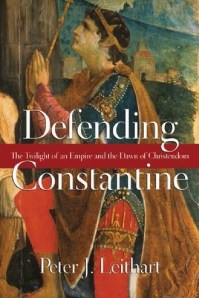Book Review: Defending Constantine


Defending Constantine: The Twilight of an Empire and the Dawn of Christendom, Peter J. Leithart, Downers Grove: IVP Academic, 2010. Paperback, 373 pages, $29.99.
The question is not whether I should put a disclaimer with this book review, but where. Let me put it right up front. Peter Leithart is a controversial figure in the Reformed and Presbyterian world. He is a signatory on the Joint Federal Vision Statement. While this book may have overlap with some Federal Vision emphases, it is not, so far as I can tell, an argument for FV theology. My recommendation of this volume is not a blanket statement of approval for Leithart and his theological trajectory. One should always use discernment when reading anything except the Bible, but I would urge a special degree of discernment when reading anything by this author.
Dr. Peter Leithart is a minister of the Presbyterian Church in America, but he is the pastor of Trinity Reformed Church in Moscow, Idaho. This church is affiliated with the Confederation of Evangelical Reformed Churches, a Federal Vision-friendly group of churches. Leithart also teaches at New Saint Andrews College in Moscow. He holds a Ph.D. in theology from the University of Cambridge. He is the author of numerous books and articles.
This book is about the first Christian Roman emperor. Constantine (ca. 272-337) is a fabled figure in church history and not always appreciated. More often than not, he becomes a lightning rod for all sorts of criticism, especially regarding the relationship between church and state.
Defending Constantine is not exactly a biography, although it definitely contains biographical aspects. Leithart tells the story of Constantine’s life. We get treatments of the standard important historical events such as the Battle of the Milvian Bridge. Constantine reportedly saw the sign of the cross and the words “In this sign conquer” in the sky. Leithart dissects this pivotal event and provides a natural explanation for the sign. The author deals with other significant happenings as well, including legislation that favoured Christians (the Edict of Milan) and Constantine’s role at the Council of Nicea in 325. All the standard questions and topics are here and therefore the book serves as a helpful introduction or review.
The main substance of the book, however, is captured in the title. Leithart’s intent is to put to bed all the unfair criticisms of Constantine that have been sounded over the years. His main target is the influential Mennonite theologian, John Howard Yoder. Leithart convincingly puts forward the case that Yoder misunderstood the history: “…his claims are, as historical claims, sometimes questionable, sometimes oversimplified to the point of being misleading, sometimes one-sided, sometimes simply wrong” (254). Yoder’s Mennonite background coloured his understanding of early church pacificism and the relationship between the emperor and the church. Many other authors have since relied on Yoder’s account of Constantine and Constantinianism, so it’s good to make another critical evaluation.
I’m not an expert on Constantine or the period in which he lived. Judging from the footnotes and bibliography, it appears that Leithart is not bringing forward any new facts. In fact, most of the book is regurgitated material from other authors. If there is anything new here, it would be in the way that the author presents the facts, coordinates them, and interprets them. This is especially the case in the concluding chapters. For example, the last chapter is entitled “Rome Baptized.” Leithart argues that Constantine baptized the Roman empire and this baptism necessarily involved the abandonment of blood sacrifices. An interesting thesis, but one that I’m not qualified to judge.
I can see three kinds of people being interested in Defending Constantine. Those who might enjoy it the most would be those with an interest in applying the Christian faith to political questions. Those with an interest in the history of the early church would also find this an engaging read. Finally, theologians will also be stimulated by considering the life and thought of Constantine. While there are a few small typos and some infelicitous expressions, generally it’s a book that reads well. It’s also well-researched. I don’t agree with Peter Leithart’s FV convictions, but I did appreciate this book.


